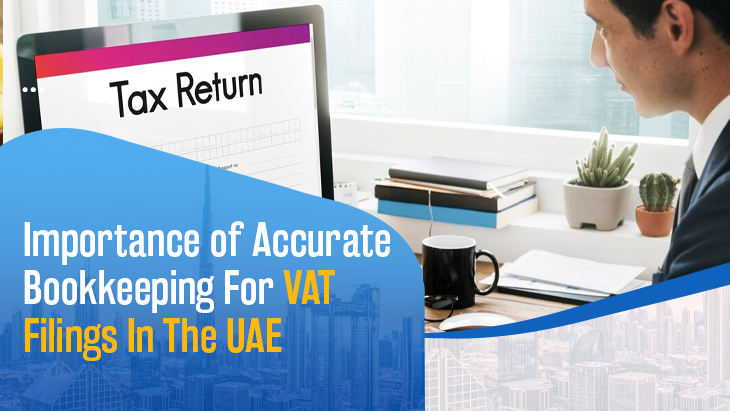With the introduction of Value Added Tax (VAT) in the UAE, accurate bookkeeping has become a vital component of financial management for businesses. VAT compliance is a legal obligation and a crucial factor in maintaining credibility with the Federal Tax Authority (FTA). In an increasingly regulated environment, businesses must ensure their financial records are precise, up-to-date, and aligned with tax laws. This blog explores the significance of accurate bookkeeping in ensuring seamless VAT filings in the UAE and outlines strategies for maintaining compliance.
Understanding VAT in the UAE
VAT and Registration Requirements in the UAE
Value Added Tax (VAT) is a consumption-based tax applied to most goods and services in the UAE. It is collected at each stage of the supply chain, with the final consumer bearing the cost. Businesses act as intermediaries by collecting and remitting VAT to the relevant government authorities. Registration is mandatory for companies with taxable supplies exceeding AED 375,000 annually. Those earning over AED 187,500 may also register voluntarily to reclaim input tax. Foreign businesses without a base in the UAE must also register. Monitoring revenue thresholds is crucial, as failure to comply can result in substantial fines from the Federal Tax Authority.
VAT registration is essential for those engaging in Free Zone Company Formation, where special tax treatment may apply depending on the nature of transactions and the zone-specific guidelines.
What is Bookkeeping?
Definition and Objectives
Bookkeeping is systematically recording, organising, and storing all business financial transactions. The primary objective is to provide accurate, up-to-date information on a company’s financial health. It ensures that income, expenses, assets, and liabilities are correctly recorded, enabling business owners and stakeholders to make informed financial decisions. Effective bookkeeping supports tax compliance, enhances financial transparency, and lays the groundwork for accurate financial reporting and informed strategic planning.
Difference Between Bookkeeping and Accounting
While often used interchangeably, bookkeeping and accounting serve distinct purposes. With the help of professional bookkeeping services in Dubai, businesses can accurately and efficiently manage the day-to-day recording of financial transactions, ensuring smooth and compliant operations. This includes maintaining ledgers, bank reconciliations, and tracking receipts and invoices. Conversely, accounting involves interpreting and analysing financial data to prepare financial statements, perform audits, and support long-term planning. In essence, bookkeeping is the groundwork that enables accurate and insightful accounting.
Why Accurate Bookkeeping Matters for VAT
Ensures Timely and Correct VAT Filings
Timely and accurate VAT filings are only possible when financial records are well-organised and maintained. Businesses offering tax and VAT Services in Dubai assist clients in tracking taxable sales and purchases, ensuring that output and input VAT are calculated accurately. Late or incorrect submissions can lead to compliance issues and financial penalties. Maintaining a clean and up-to-date ledger enables businesses to meet filing deadlines, minimise errors, and ensure accurate VAT submissions throughout every tax period.
Reduces the Risk of Fines and Penalties
The FTA imposes strict penalties for late VAT filings, underreported income, and incorrect input tax claims. These penalties can include fixed fines and percentage-based fines calculated on the unpaid tax. Accurate bookkeeping minimises the risk of such penalties by ensuring all relevant data is properly recorded and readily available for submission. Businesses that invest in accurate recordkeeping can significantly reduce their exposure to fines and safeguard their financial health.
Builds Business Credibility with the FTA
Consistently accurate VAT records reflect a business’s commitment to regulatory compliance. This not only helps avoid audits but also establishes credibility with the FTA. A company known for its compliance will likely experience smoother transactions with regulatory bodies and less scrutiny during VAT reviews or refund applications. For companies undergoing Company Formation Services in Dubai, a compliance-first approach sets a strong precedent for future financial practices.
Common Bookkeeping Errors That Impact VAT Filings
Misclassification of Expenses and Revenues
Incorrectly classifying items as taxable or exempt can result in inaccurate VAT calculations. For example:
• Treating zero-rated supplies as exempt may result in the loss of input VAT recovery.
Misreporting personal expenses as business-related can result in overstated deductions.
• Failing to segregate VAT-exempt income from taxable revenue may distort VAT filings.
These classification errors can accumulate over time, resulting in discrepancies in VAT returns and potentially leading to audits by the FTA.
Missing or Incorrect Tax Invoices
The FTA requires businesses to issue tax-compliant invoices with specific information such as the VAT registration number, tax amount, and supplier details. Common mistakes include:
• Missing supplier TRN (Tax Registration Number)
• Incorrect VAT rates applied
• Lack of proper invoice numbering
These issues may lead to disallowed input VAT claims and raise questions during audits.
Failing to Record Reverse Charge Mechanisms
Under the reverse charge mechanism, the responsibility to account for VAT on imported goods and certain services shifts from the supplier to the buyer. Key bookkeeping lapses in this area include:
• Not accounting for VAT on imports
• Failing to reflect reverse charge entries in VAT returns
• Missing documentation for cross-border transactions
Businesses involved in international operations or Free Zone Company Formation in Dubai must pay close attention to these VAT rules.
Legal Implications of Poor Bookkeeping
FTA Audits and Assessments
Businesses with inconsistent or inaccurate financial records are more likely to be flagged for FTA audits. During an audit, the FTA reviews the accuracy of VAT filings, supporting documentation, and compliance history. A failed audit can lead to reassessments, where additional tax is calculated and demanded, along with potential penalties.
Administrative Penalties
The FTA enforces a range of administrative penalties for non-compliance. These include fines for late registration, filing errors, tax return errors, and failing to issue proper invoices. Penalties can be cumulative and may severely impact the financial stability of small and medium enterprises (SMES). Proper bookkeeping reduces the likelihood of these penalties by ensuring compliance at every step.
Criminal Liability in Extreme Cases
In severe cases, deliberate tax evasion, record falsification, or fraudulent claims can result in criminal prosecution. This may result in imprisonment, fines, or even the closure of the business. Accurate bookkeeping safeguards against such extreme outcomes by promoting organisational transparency and accountability.
Bookkeeping Best Practices for VAT Compliance
Use of Accounting Software
Utilising reliable accounting software significantly improves accuracy and efficiency in bookkeeping. Software solutions:
• Automate VAT calculations
• Generate error-free tax reports.
• Send reminders for filing deadlines.
• Integrate with bank accounts and invoicing tools.
Cloud-based platforms offer real-time data access, enhanced security, and simplified collaboration across departments.
Monthly Reconciliations
Reconciling bank statements with accounting records every month helps identify inconsistencies or unauthorised transactions. Benefits include:
• Early detection of data entry errors
• Confirmation that all transactions are recorded
• Identification of any bank fees, interest, or charges
• Preparation of accurate VAT returns
Monthly reconciliations also support error correction before submissions are made to the FTA.
Keeping Organised and Complete Records
Maintaining a centralised repository for all financial documents is crucial for audit readiness. Best practices include:
• Storing digital copies of tax invoices, receipts, and contracts
• Organising documents by date and transaction type
• Backing up records securely in the cloud or external systems
• Retaining VAT-related documentation for a minimum of five years
Proper documentation ensures long-term compliance and simplifies future audits or reviews.
Role of Professional Bookkeepers and Accountants
How Professionals Ensure Compliance
Experienced bookkeepers and accountants are well-versed in the intricacies of VAT regulations. They ensure financial records align with FTA guidelines and identify potential risks before they escalate. Professionals also stay up-to-date on regulatory changes, enabling businesses to adapt quickly to new compliance requirements.
Outsourcing vs In-House Bookkeeping
Outsourcing bookkeeping allows businesses to access expert services without the overhead costs associated with hiring full-time staff. It is particularly beneficial for SMES, which lack the resources of an in-house finance team. However, larger organisations may prefer in-house bookkeeping for greater control and direct oversight. The decision depends on the business's size, budget, and the complexity of its operations.
Benefits Beyond Compliance
Better Financial Decision-Making
Accurate bookkeeping provides a clear picture of a company’s financial status, enabling informed decision-making and informed decision-making. Based on reliable data, business owners can analyse trends, manage cash flow effectively, and plan for future investments.
Smooth Audits and Reviews
Well-maintained records ensure that audits, whether internal or conducted by the FTA, proceed smoothly and efficiently. Prompt availability of supporting documents and accurate reports minimises disruptions and fosters stakeholder confidence.
Easier Access to Financing
Financial institutions require detailed financial statements for evaluating loan applications or investment proposals. Organised and accurate bookkeeping enhances credibility and increases the likelihood of securing financing.
How SMES in the UAE Can Stay on Top of VAT Compliance
Educating Staff
Finance, procurement, or sales employees should be trained on VAT basics, invoice requirements, and documentation standards. Regular training sessions help build a compliance-first culture and reduce human errors in bookkeeping.
Leveraging Technology
Implementing digital tools, such as accounting software, e-invoicing systems, and cloud storage solutions, can enhance efficiency and accuracy. Technology reduces manual entry, lowers error rates, and facilitates real-time transaction tracking.
Regular Consultations with Tax Advisors
Periodic reviews with VAT consultants ensure that the business complies with evolving regulations. Advisors can conduct mock audits, review VAT returns, and provide strategic insights for optimising tax liability.
Preparing for an FTA VAT Audit
What Documents Should Be Ready?
• Tax invoices (sales and purchases)
• Payment receipts and bank statements
• Filed VAT returns and payment confirmations
• Contracts with suppliers and customers
• Audit trails and system-generated reports
How to Handle an Audit Professionally
Assign a dedicated compliance officer to liaise with the FTA during the audit. Ensure all requested documents are readily available and clearly labelled. Respond promptly to FTA queries and maintain professional communication throughout the audit.
Future of VAT and Digital Bookkeeping in the UAE
Upcoming Trends
The future of VAT compliance in the UAE lies in digital transformation. Businesses are adopting cloud-based ERP systems, automated reconciliation tools, and AI-powered analytics to streamline their finance functions. This shift promises increased accuracy, efficiency, and scalability.
FTA’s Move Towards Automation
The FTA is introducing enhanced online portals and systems to facilitate e-filing, real-time validation of tax data, and integration with accounting platforms. These developments will reduce manual errors and improve the overall compliance ecosystem.
Conclusion
Accurate bookkeeping is a necessity and a strategic asset in the UAE's VAT landscape. It ensures compliance, reduces risks, and supports overall business growth. Businesses, especially SMES, should adopt best practices, utilise technology, and seek professional guidance to stay ahead of VAT obligations.
Partner with Bizex LLC to provide expert TAX & VAT services in Dubai. Our experienced consultants provide expert assistance with accurate bookkeeping, timely VAT filings, and ensuring full compliance with UAE regulations. Focus on growing your business while we handle your financial accuracy and regulatory requirements.
FAQs
1. What are the VAT rates in the United Arab Emirates (UAE)?
The standard VAT rate in the United Arab Emirates (UAE) is 5%. Depending on the FTA guidelines, certain goods and services, such as healthcare and education, may be zero-rated or exempt from tax.
2. Can I file VAT returns manually?
No. Under current regulations, all VAT returns must be filed electronically through the FTA's official e-Services portal. Manual submissions are not accepted.
3. How long should I keep VAT records in the UAE?
According to FTA regulations, businesses must retain VAT-related records for a minimum of five years. The retention period may be longer in certain industries, such as real estate.
4. Do I need a tax advisor to file VAT?
While not legally required, hiring a tax advisor is highly recommended. Advisors help ensure accuracy, prevent costly errors, and comply with regulatory changes.
5. What’s the deadline for VAT returns?
VAT returns in the UAE are typically filed on a quarterly basis. The deadline is within 28 days after the end of each tax period. The FTA may assign a monthly filing in specific cases.











Leave a reply